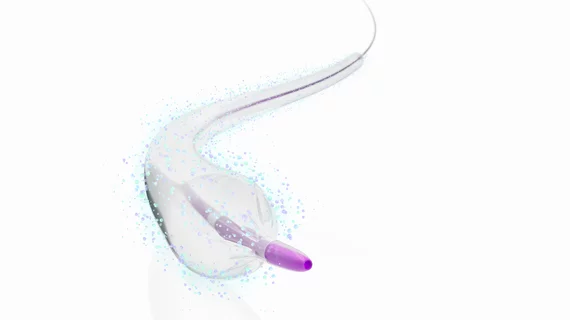Medtronic has received FDA approval for its IN.PACT 018 Paclitaxel-Coated Percutaneous Transluminal Angioplasty (PTA) Balloon Catheter to treat patients with peripheral arterial disease (PAD) in the superficial femoral and popliteal arteries.
This new drug-coated balloon (DCB) was approved for the treatment of de novo, restenotic or in-stent restenotic lesions. It uses the same drug coating formulation as the IN.PACT Admiral DCB, is compatible with 0.018” guidewires and can treat vessel diameters that range from 4 to 7 mm.
According to Medtronic, the IN.PACT 018 DCB is now the only DCB with a 200 cm over-the-wire catheter length on the market. The company’s goal was to make it easier for physicians to treat PAD patients using femoral or radial access.
“The IN.PACT 018 DCB will allow physicians to better address challenging cases, such as those with narrow lesions or complex anatomies,” Prakash Krishnan, MD, associate professor of medicine, cardiology and radiology at the Icahn School of Medicine at Mount Sinai and a Medtronic advisory board member, said in a statement.
“Medtronic is committed to offering physicians a suite of products to treat patients with PAD,” added David Moeller, president of Medtronic’s peripheral vascular health operating unit. “Based on feedback from our clinical community and the need for an 0.018” guidewire compatible DCB, Medtronic is excited to bring this technology to market in the United States. The addition of the IN.PACT 018 DCB further reinforces Medtronic’s commitment to being the market leader in drug-coated balloons.”
Related Vascular and Endovascular Content:
Open AAA repair linked to better long-term outcomes than EVAR
VIDEO: What interventional cardiologists need to perform pulmonary embolism thrombectomy
New atherosclerosis treatment uses ultrasound-assisted lasers to break down plaque
Empagliflozin may reverse vascular aging, lower CVD risk
Intravascular lithotripsy tied to superior long-term PAD, PCI outcomes at SCAI 2022

